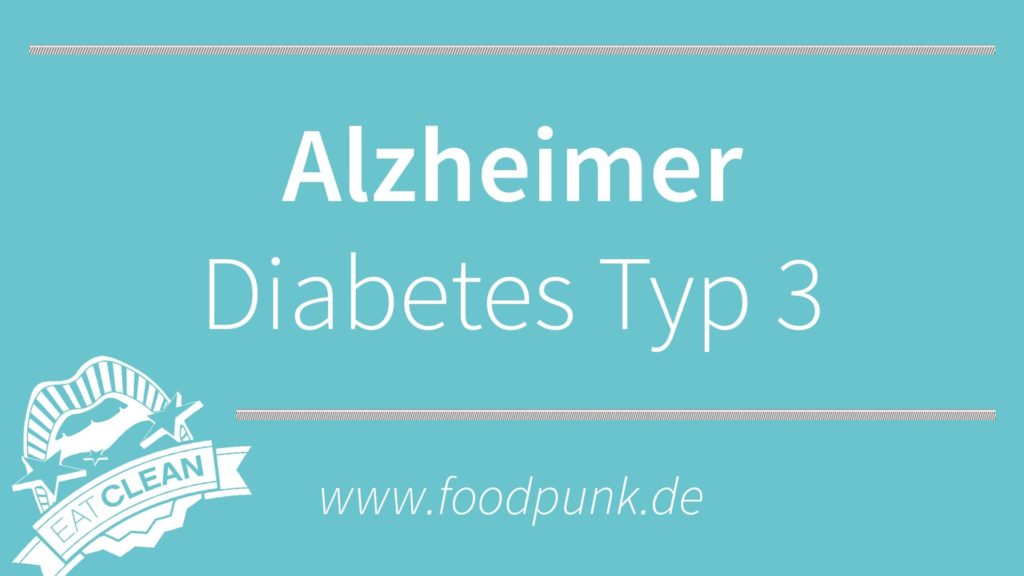Alzheimer’s is also called type 3 diabetes by researchers. But why? What does this disease, whose most obvious symptom is dementia, have to do with sugar and insulin?
Alzheimer’s is Diabetes Type 3 – The Daily Bite of Knowledge

Table of contents
1. what is Alzheimer's disease?
Alzheimer’s disease is a neurodegenerative disease. Neurodegenerative means that the disease affects the nervous system and as the disease progresses, more and more nerve cells die. This leads to neurological symptoms, for example dementia or movement disorders (e.g. in the neurodegenerative disease Parkinson’s). Alzheimer’s disease is officially called Alzheimer’s disease or Morbus Alzheimer and was first described by Alois Alzheimer in 1906. Many people equate the terms Alzheimer’s and dementia, but this is not correct. Depending on the severity of dementia, memory may be impaired, thinking skills may be impaired, or emotional and social skills may be impaired. Dementia is a symptom of Alzheimer’s disease. However, dementia can also have other causes. In addition to dementia, Alzheimer’s disease can also cause perceptual disorders.
Du möchtest dich auch gesünder ernähren?

2. what is diabetes?
Diabetes, or more precisely diabetes mellitus, is often colloquially called diabetes or “sugar” (“I have sugar”). Type 1 diabetes is an autoimmune disease. The patient’s own immune system destroys the cells of the pancreas that produce insulin. Without insulin, blood glucose cannot be delivered to the tissues, it accumulates in the blood and leads to high blood glucose levels. Type 1 diabetics usually need to inject insulin.
Type 2 diabetes usually develops in advancing age, and less frequently in younger people. The main cause is obesity. The pancreas produces insulin, but the cells no longer listen to this signal. Insulin resistance is present, which also leads to high blood glucose levels.
Among other “side effects,” high blood sugar levels can damage blood vessel walls.
3. Alzheimer's disease and diabetes
The term type 3 diabetes is not a recognized diagnosis in medicine. Researchers use the term, however, to highlight the similarity between Alzheimer’s disease and diabetes. Even before the first symptoms of dementia appear, it can be observed in Alzheimer’s patients that the absorption of glucose (blood sugar) into the brain decreases. Actually, the brain and all nerve cells can absorb glucose independently of insulin, i.e. without the effect of insulin. Nevertheless, poorer glucose uptake is similar to insulin resistance, in which muscles, for example, have difficulty absorbing glucose.
Type 2 diabetes and Alzheimer’s disease share many risk factors: for example, obesity is a risk factor for both diseases. High cholesterol, high blood pressure and type 2 diabetes in themselves can also promote Alzheimer’s. This close association with metabolic syndrome is another reason for the Alzheimer’s nickname “type 3 diabetes.”
Reduced glucose uptake into the brains of Alzheimer’s patients causes nerve cells to “starve” and die. It promotes neurodegeneration. Researchers are currently debating whether the alternative fuel ketone bodies can compensate for this lack of energy in the brain. In fact, ketone bodies appear to be neuroprotective in the brain, that is, protective of brain cells.
Always stay up to date with our Newsletter.
The daily bite of knowledge
This new section is intended to provide a brief look at topics in nutrition science. If there are any topics you are particularly interested in, please leave us a comment.
Similar posts by Foodpunk

How do ketone bodies become energy?
Ketone bodies are produced in the liver and then enter the blood. They are small and well soluble in water. This allows them to be wonderfully transported throughout the body.

5 tips for more fitness in winter
5 tips to help you avoid winter fatigue and feel really fit in the darker months of the year.

What is a refeed suitable for? – The daily bite of knowledge
A refeed is useful for all people who follow a very low-carbohydrate diet (under 30-50 g of carbohydrates per day) for a longer period of time and do this diet for more fitness, well-being and a weight loss.

Coconut oil vs. MCT oil – The daily bite of knowledge
A comparison of the two fats in a practical overview.

5 Facts about Vitamin D – The Daily Bite of Knowledge
For what do we need the vitamin? What does this have to do with cholesterol? Learn more about it here!

The fatty tissue? This is for saving. It stores fat. This is what most people know about adipose tissue.

Gelatin vs. collagen – what is the difference?
Gelatin and collagen, both have something to do with connective tissue, but what again exactly? Kick yourself into our article and learn more.

What is the difference between Paleo, Low Carb and Keto?
Stop the confusion! Here you can read what's behind Paleo, Low Carb and Keto. What are the differences? What the similarities? Which diet is the right one?
